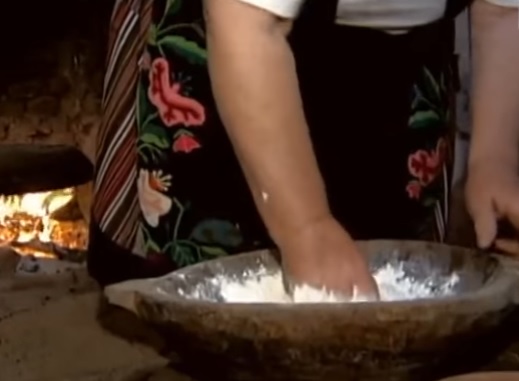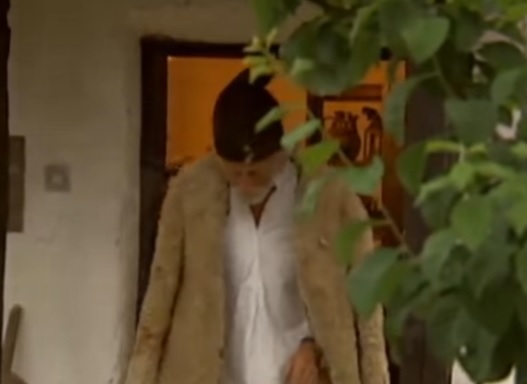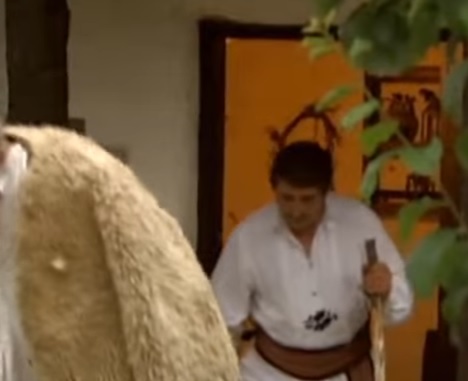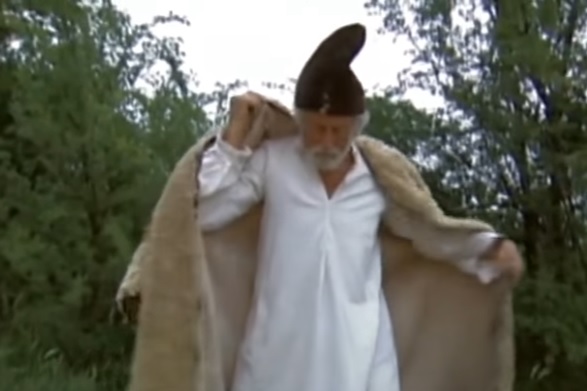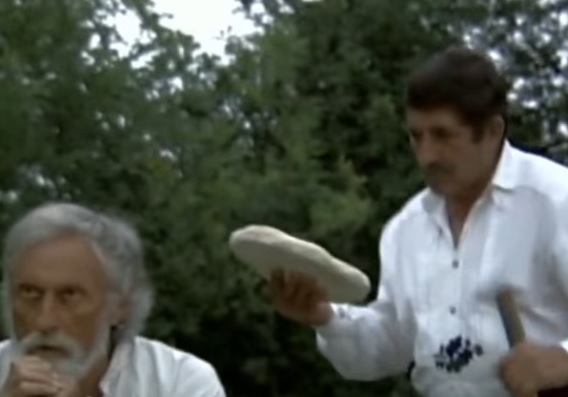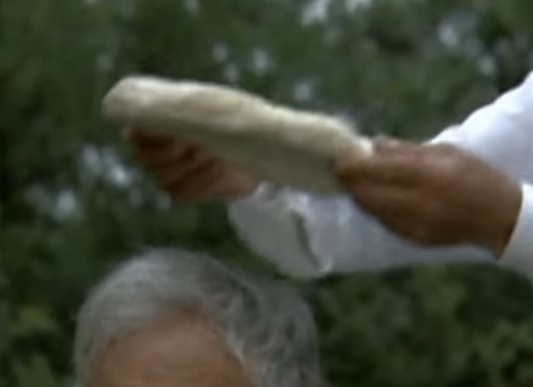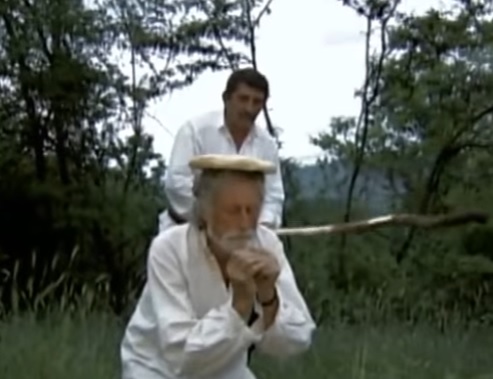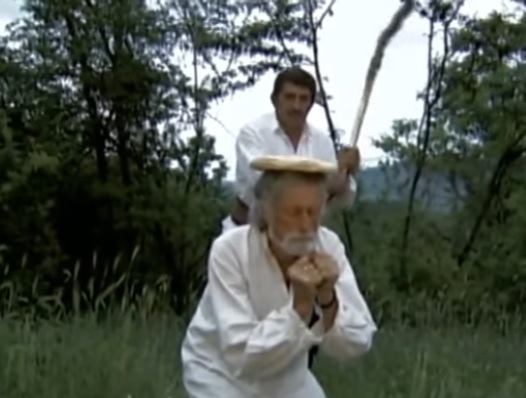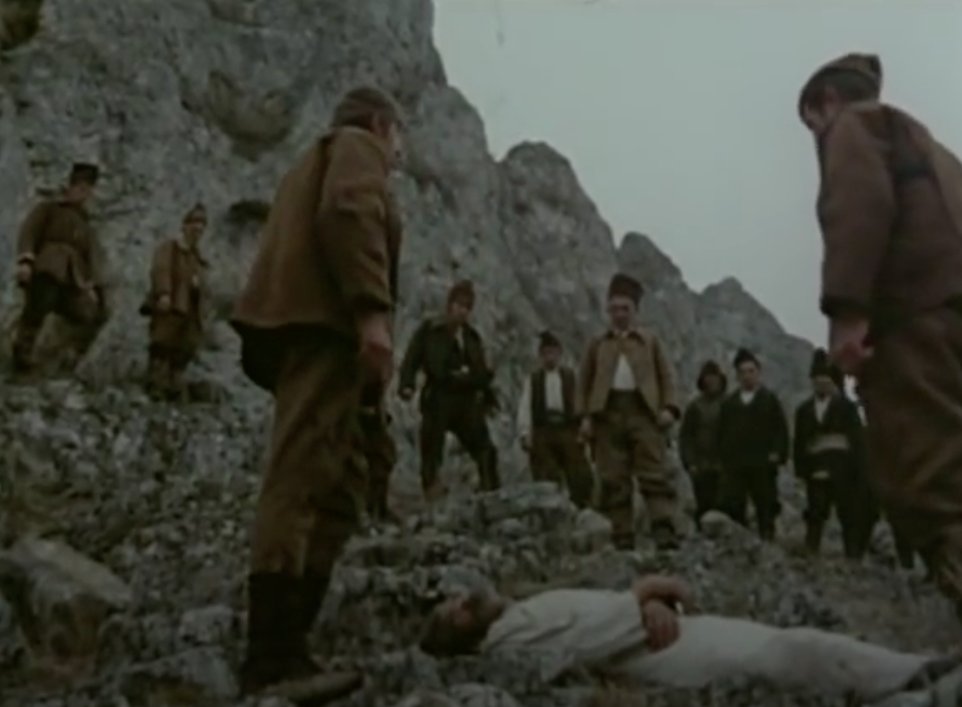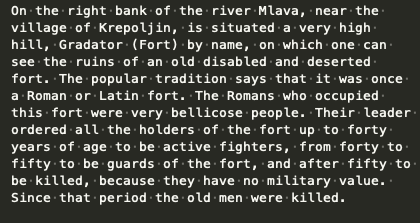Thread: According to ethnographic data from the late 19th, early 20th century, there once was a custom in Carpathian mountains of Serbia and in Dinaric mountains of Montenegro for children to kill their parents when they got too old...First a ritual bread was baked ad dawn...
The old man or a woman would get up, dress in their best clothes, have breakfast and say goodby to the family. They would then leave the family house carrying the sacrificial bread, accompanied by one of their sons, usually the eldest who carried a stick...
The elderly was then taken to some isolated wild place, where he would kneel down and say his prayer...
The son would then strike the bread with the stick saying: "It is not me killing you, it is bread killing you"...
In some parts of Serbia the whole village was invited to witness the ceremonial killing of the elderly and to partake in the ceremonial feast afterwards...And in some parts the whole village actually killed the elderly...
The custom was in Serbia known as "Lapot" and the pictures are stills from a film "Lapot, real custom or myth" https://www.youtube.com/watch?v=U0yKabmPXP4&t">https://www.youtube.com/watch...
In Montenegro this custom was slightly different. There the elderly was taken to the mountain accompanied by the whole village. The elderly lied down on a platform made from compressed dirt. and clump of wool was placed on his head...
The elderly was then either stoned to death or killed with an axe, stick, mallet strike to the head...These last two pictures are stills from the film about Montenegrin "Lapot" which was there known as "Postevovanje" https://www.youtube.com/watch?v=AEMeg3sFPww">https://www.youtube.com/watch...
Ethnographers today (last 20-30 years) doubt whether this ritual killing once really existed and if it did, when was the last time it was performed. But in the past there was no such doubt. All 19th,20th century ethnographers and historians believed that Lapot indeed once existed
They based their conviction on the huge amount of available ethnographic material confirming that ritual killing of old people was once a common practice...
For instance a saying from southern Serbia, that when someone is old "they are ready for an axe" (one of "Lapot" weapons)
For instance a saying from southern Serbia, that when someone is old "they are ready for an axe" (one of "Lapot" weapons)
In Eastern Serbia in the 20th c. there was still a custom to have all burial rituals performed for still living old people when they reach certain old age "as if they died". During the ritual the old people "were hiding". Then when they actually died, no rituals were performed...
Ethnographers who collected the data about this custom, believed that this was a remnant of the actual "Lapot", custom killing the elderly when they reach the certain age, now performed symbolically....
Lapot was not seen as a murder. This was a ritual killing performed to end life in a "proper way". The rituals were all strictly observed "so as to insure the safe passage of the elder& #39;s soul to the otherworld" and "to avoid the soul& #39;s revenge"...
The "victim" wanted to go to the otherworld before they became incapacitated and unable to care for themselves and before they became a burden to their families...
The reason why the elderly didn& #39;t want to be a burden on their families is easy to understand. These customs were recorded in areas where transhumance was practiced. And in order to go up and down the mountains after flocks, everyone had to be able bodied...
The reason why the elderly would want to go to the otherworld before they became incapacitated comes from the belief that we will spend the eternity in the otherworld the way we entered it...So if we enter it incapacitated and suffering...
Now many people (in Serbia) believe that this is only a custom found among Serbs in Serbia (and Montenegro). Some people believe that this is a "slanderous lie made up to make Serbs look bad"...Neither is true...
That Lapot really was a custom practiced by Serbs in the past is supported by the fact that there are legends from South Baltic which tell us that Sorbs there also practiced the same custom:
"During heathen times the Sorbian Wends of Lužice practiced the shameful and gruesome custom of ridding themselves of their old people who were no longer able to contribute..."
"A son would strike his own father dead when he became old and incompetent, or he would throw him into water, or he would push him over a high cliff. Indeed, there are many examples of this, even after the advent of Christianity..."
"In olden times many heathens lived around here, and it is still told how they put to death old people who were over sixty years of age..."
The "over 60 years of age being too old" is very interesting. In "Old Age in the Roman World: A Cultural and Social History" by Tim G. Parkin we read that in Rome old men over the age of 60 were relieved of their duties...
The case of institutionalized senicide occurring in Rome comes from a proverb stating that "60-year-olds were to be thrown from the bridge"...But that was "disputed as a slander" by the Romans... https://abs.twimg.com/emoji/v2/... draggable="false" alt="🙂" title="Leicht lächelndes Gesicht" aria-label="Emoji: Leicht lächelndes Gesicht">
https://abs.twimg.com/emoji/v2/... draggable="false" alt="🙂" title="Leicht lächelndes Gesicht" aria-label="Emoji: Leicht lächelndes Gesicht">
The "magic 60" is also found among Greeks. The famous Greek athlete Grillus is told at the age of 60 to die and become ashes, as stated by Greek poet Herondas. According to Lucian, philosopher Peregrinus strangled his father to death at the age of 60, because he lived enough....
In Ancient Greece, Athenian law required that children care for their aging parents, and the punishment was loss of citizenship (the second most severe punishment for Athenians, besides execution)...
If people normally did care for their old parents, why would Athenians need such draconian punishments for the ones who didn& #39;t?
According to Hellanicus, Hyperboreans took old people who reached 60 years of age outside of their city gate and killed them...
According to Pomponius Mela, Hyperboreans, on achieving full life, quite cheerfully leapt from a certain rock into the ocean. Pindar notes that because of this practice no age related debilities and diseases affect Hyperboreans...
Diodorus Siculus says that on the legendary island in the south, people live very long. But that if they become ill or disabled, they are forced to die. They also have the law that prescribes what is the longest anyone can live...
So whether Romans practiced senicide, and whether the Greeks practiced it before them as a custom, is debatable. But there is actually a legend in Serbia that blames the custom of Lapot squarely on the Romans...
But it wasn& #39;t just Romans, Greeks and Serbs who practiced this custom...I started this thread as a response to this tweet by Dr Sophie Hay: https://twitter.com/pompei79/status/1330127425246801926">https://twitter.com/pompei79/...
Aelian writes that:
"It was a custom in Sardinia that the children of aged parents beat them to death with clubs and buried them, in the belief that it was wrong for the excessively old to continue living, since the body, suffering through age, had many failings..."
"It was a custom in Sardinia that the children of aged parents beat them to death with clubs and buried them, in the belief that it was wrong for the excessively old to continue living, since the body, suffering through age, had many failings..."
Also, apparently "The Derbiccae (a tribe, apparently of Scythian origin, settled in Margiana, on the left bank of the Oxus) kill those who are seventy years of age. They sacrifice the men and strangle the women...
Herodotus tells us about the Massagetae (Eastern Iranian nomadic tribal confederation) that: "Though they fix no certain term to life, yet when a man is very old all his family meet together and kill him, with beasts of the flock besides, then boil the flesh and feast on it..."
According to Silius Italicus, in Spain people when they get old kill themselves rather than suffer through old age. He says that Cantabrians "...when found disabled by white old age, find strange pleasure in cutting short the years of weakness by instant death..."
Many more reports about senicide from ancient texts can be found on this great site https://laudatortemporisacti.blogspot.com/2012/06/senicide-part-i.html">https://laudatortemporisacti.blogspot.com/2012/06/s...
There is no point me going on and on and on...We know that this was once a widespread practice...But it was believed that it disappeared long time ago...It seems that it survived among the Serbs (Sorbs) of Central Europe, longer than anywhere else...
When it was finally abandoned is still an open question. Also why it was abandoned...Many legends give us the fact that "the young people finally realised that old = wise and that wisdom is useful" as a reason why this custom was abandoned...
Some say Christianity is to blame...Or to thank for the abandonment of this custom...Well ultimately I would point my finger at the Pythagoreans...
Their doctrine held that all creatures were being punished by the gods who imprisoned the creatures& #39; souls in a body. Thus, any attempt to alter this punishment would be seen as a direct violation of the gods& #39; wills...
Hence our today& #39;s outlook on senicide and eutanasia...I am not advocating either by the way, just showing your where yours (and mine) deepest held belief that killing the elderly, even if they want to be killed, is wrong actually comes from...
From the belief that this is hell where we are all supposed to suffer to the end...And there is no place where young handsome warriors will spend the rest of eternity prancing around in their best armour after dying a glorious death in battle... https://twitter.com/serbiaireland/status/1320376191853932544">https://twitter.com/serbiaire...
And there is no place where young beautiful maidens will spend the rest of eternity partying in their best clothes and jewelry https://twitter.com/serbiaireland/status/1320374113102405635">https://twitter.com/serbiaire...
So we all cling to life for as long as we can...Me included...
Except....This old belief, which I believe was behind Lapot and similar customs, is the reason we still dress our dead "in their best" and put makeup on them "to make them look their best"...When they enter eternity...

 Read on Twitter
Read on Twitter